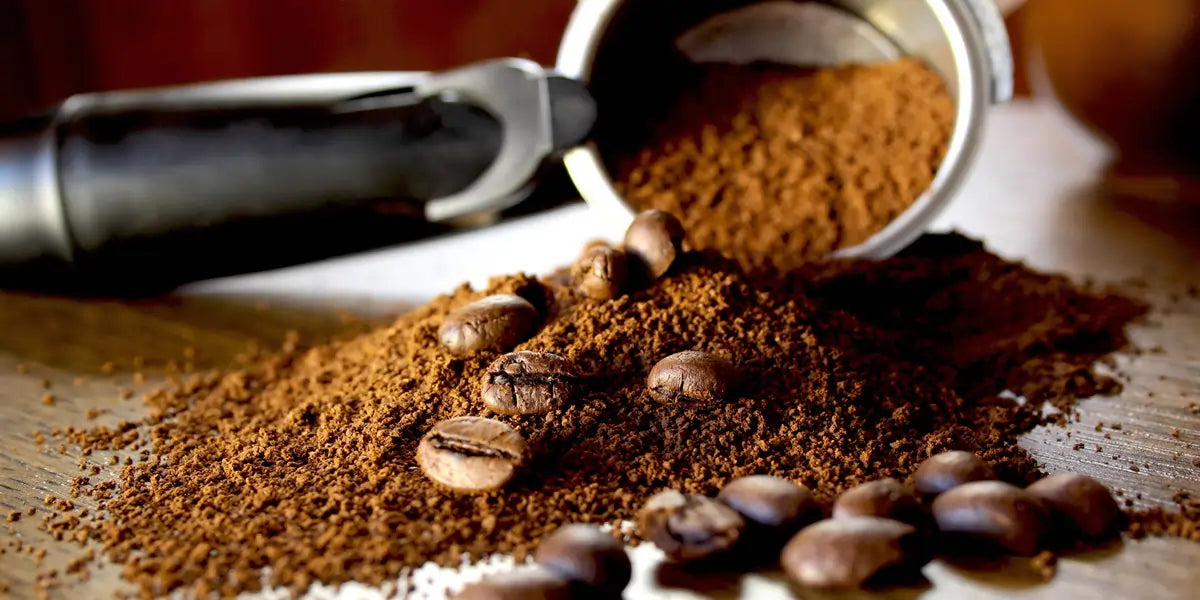If you throw away coffee grounds, it could mean waste. Some gardeners believe that coffee grounds can make the garden better. Used coffee grounds are better for your garden than fresh coffee grounds. Are you planning to recycle coffee grounds?

(coffee grounds garden)
Follow our tips and advice on how to give coffee grounds a second life! We hope these fun tips will bring joy to your gardening life!
Why use coffee grounds?
Benefits of coffee grounds
Coffee grounds contain several key nutrients that plants need, including nitrogen, potassium, magnesium, and calcium. And, coffee grounds help improve the soil's ability to hold water.
Choosing used coffee grounds
Used coffee grounds are better for your garden and plants. Fresh coffee grounds contain higher acidity and caffeine, which can harm your plants. Most plants prefer low-acid or acid-free soil.
How to use coffee grounds?
Using coffee grounds to make liquid fertilizer
You can make liquid fertilizer from used coffee grounds. Soak used coffee grounds in water for a few nights, stirring occasionally, which will break down some of the nutrients in the coffee.

(coffee grounds as fertilizer)
Then strain the liquid through a cotton cloth so you get a nutrient-rich liquid fertilizer.
Using coffee grounds to make compost
Garden beds are often used as compost bins and you can add used coffee grounds directly to your compost pile. Compost piles usually consist of vegetable peels, fruit peels, fallen leaves, and other plant debris.
You should be careful about adding coffee grounds to your compost pile. Excessive coffee grounds can cause adverse effects on plants, such as leaf burn and nutrient overload. It is recommended that compost contain no more than 30% coffee grounds by volume to ensure a diverse composition.
You can also make good quality compost based on a ratio of 1/3 grass, 1/3 used coffee grounds, and 1/3 leaves.
Using coffee grounds to improve soil texture
Coffee grounds can help you make your soil better. Add coffee grounds to the soil in a thick layer, where they will be compacted and impermeable to water. Coffee grounds are weakly acidic, which lowers the pH of the soil and improves its quality and organic matter content.
Coffee grounds decompose slowly, releasing nitrogen and other nutrients over a long period while keeping the soil loose and aerated.
Spraying with coffee grounds
You can use coffee grounds to make unique garden sprays. This spray contains the nutrients that garden plants need and is antibacterial. Gardeners use this spray to repel pests such as caterpillars. The coffee flavor can help make plants less attractive to animals.
Sprinkle coffee grounds around plants
To prevent pests like slugs and snails from harming your plants, you can sprinkle a moderate amount of coffee grounds around your plants. Coffee grounds will not adversely affect your soil, but they will irritate animals, which will keep them away from your plants.
Using coffee grounds as mulch
Every gardener knows that mulch is good for plants. Used coffee grounds can also be used as mulch to protect your plants.
However, you should not cover your plants directly with used coffee grounds, as this can lead to stunted plants.

(coffee grounds as mulch)
The best way to do this is to mix coffee grounds with other plant material or organic debris. Or you can add a thin layer of coffee grounds to the soil and break it up with a rake. This way, the coffee grounds will spread out and not clump.
What plants like coffee grounds?
To get the best out of coffee grounds in your garden, plant plants that like coffee grounds. Usually, coffee grounds are suitable for acid-loving plants.
Roses
Rose gardeners can try used coffee grounds as mulch or compost. Adding coffee grounds to the roots of roses can provide extra nitrogen.

(red rose)
And, coffee grounds also provide phosphates, copper, and potassium to roses. Use coffee grounds in small amounts, too much nitrogen can burn rose roots
Carrots
Carrots are one of the common vegetables found in gardens and balconies and are easy to grow. One gardening tip is to mix young carrot seedlings with coffee grounds. Used coffee grounds can provide nitrogen fertilizer to carrot seedlings.
Blueberries
Blueberries grow healthily in acidic soil. Blueberries love coffee grounds because they make the soil more acidic. Coffee grounds can help suppress weeds, which is good for blueberries.
Cabbage
Many pests love cabbage; slugs and snails can eat an entire cabbage in one night. Spreading a layer of coffee grounds near your cabbages can create a barrier. Spiders, aphids, slugs, and other pests don't like the melanoidin compounds in coffee grounds.
Lilies
Whether your lilies are growing indoors, in an outdoor garden, or a greenhouse, coffee grounds can benefit your flowers. Your lilies need a high-nitrogen fertilizer with a little acidity, and coffee grounds provide nitrogen, phosphorus, and potassium.

(lily flower)
And, using coffee grounds will keep pets away from your plants. Cats and dogs don't like the odor and texture of coffee grounds.
What plants don't like coffee grounds?
Plants that are suited to neutral or alkaline soil do not like coffee grounds. For plants that do not like acidity, coffee grounds may inhibit their growth. Tomatoes, peppers, lavender, petunias, geraniums, and ryegrass do not like coffee grounds.
Use coffee grounds with caution
While used coffee grounds have some benefits for plants. However, this unique mulch is still controversial. Using coffee grounds with caution is better for your plants and soil.








